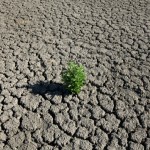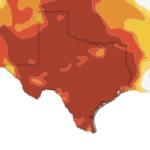Voices from the Drought: Readers Respond
 Our new interactive webpage on the drought has resulted in quite a few comments from readers with their own stories and thoughts about the Texas drought. Here’s a roundup of some of those responses:
Our new interactive webpage on the drought has resulted in quite a few comments from readers with their own stories and thoughts about the Texas drought. Here’s a roundup of some of those responses:
What’s Being Done to Plan for a Drier Future?
Many readers were concerned about planning for future droughts like the one that began in 2010.
Commenter Theodore Roberts says what planning is being done doesn’t factor in a changing climate:
“Interesting that the 5 solutions listed ignore entirely the root cause of this crisis. Where is the plan to reduce carbon emissions, consume less petroleum and electricity, and the face the simple reality that temperatures are going rise and rise over the coming decades? Global warming is a reality and no amount of wishful thinking or anti-science hysteria will make a difference.”
Reader ErnestPayne says a broader approach is needed, but will be difficult:
“Good and worthwhile planning for the future (with, among other things, the exception of the underfunding of fire services). Unfortunately it comes up against Texan / American dislike of government interference in their lives. “
Mjlatta says the 2060 State Water Plan isn’t forward-thinking enough:
“The State water policy reflects the mind set of 50 years ago, new reservoirs, surface water. We have yet to see any new thinking. Conservation has become a dirty word, ground water law has yet to see any revision from what was written 100 years ago and there is not one word about rain water collection.”
Who’s to Blame?
Rick Johnson doesn’t understand why potable water is being used for non-potable needs:
“I think it is time to move toward a clean/potable water supply, separate from the current one. The current water supply will be switched over to include water suitable for everything except drinking. We are washing ourselves and our cars and watering our gardens and lawns and supplying thirsty industrial processes with very clean, drinkable water. The very clean, drinkable water is becoming very expensive. The dirtier “wash” water would be very inexpensive.”
And commenter Pangolin isn’t very sympathetic to what Texans have been going through:
“I’m not even pretending to feel bad about this. The voters of Texas have repeatedly selected anti-science politicians and climate-change deniers to represent them despite being right at the top of the likely impact list. Eat it; it’s what you asked for.”
How the Drought Impacted Texans Across the State
Sandra Pinkerton writes that she got to appreciate a little of what farmers and ranchers went through this year:
“Loss of hay grown in the state caused serious hardships for those with horses and cattle. Hay costs for feeding horses went up astronomically with hay having to be imported into the state. Not only high prices, but normal payment arrangements were changed as hay became an emergency item to be purchased. Horse sales declined and horses all over the state starved and/or were abandoned as the economy worsened, both, due to the effects of the drought and other factors. Had I not owned a couple of horses, I might never have appreciated the extended impact of the drought. As a city person, I hear about the fires, listen to the news about level of our lakes, etc., and abide by the summer water conservation restrictions. But this was the first year that I, myself, experienced “hay emergencies” and therefore appreciated what ranchers and farmers have been enduring.”

Photo by Filipa Rodrigues/StateImpact Texas
Pati Jacobs on her cattle ranch outside of Bastrop, Texas
Rancher Richard echoes those sentiments:
“I had stock tanks go dry that had NEVER gone dry before. The operators that sold out last spring got laughed at for a while. The cattlemen that held on, well, they quit laughing…”
Even city dwellers felt the drought’s impact in their pocketbooks. Reader Lane Fletcher:
“My house in Houston was built in the 1970s, with beautiful oak floors. The drought and extreme heat caused the planks to split and separate, requiring $1800.00 worth of repairs. Who’d have thunk?”
Houston Meteorologist says last year was a disaster:
“Look, my relatives manage cattle in Texas. It was an ugly year last year. Grass so dry it just crumbled into dust. Tanks were bone dry. Any clue what it costs to truck in water and hay?? Tens of thousands of dollars. You think folks just keep that kinda cash lying around for a rainy day. No. They don’t.”
EllaHav says budget cuts to volunteer fire departments make fighting wildfires more difficult:
“Last year during droughts and fires, the state cut the volunteer fire department budgets by $30 million. The fires were such economic strain that some VFDs closed and left others depleted of supplies and over-used equipment. So they are scrambling for the few grants that are available.
I realize we are hit up constantly for nonprofit donations…please consider that firefighters save everyone with every kind of sickness, disability, income range, wealth, age, race, gender, animal, pet, structures. Please donate generously.
In small towns and rural areas, such as North Central Texas low income counties, VFDs don’t have adequate fireproof jackets and boots, but when called they leave their families to help others.”
And in closing, reader Daniel Elder has some thoughts about preparing for the future:
“Global warming is a separate issue from water conservation and the proper stewardship of our most important natural resource. One of Texas’s big problems is our failure to recognize how behind we are with our water supply per capita (our population is exploding as people immigrate from all over the US and Mexico).
In Texas we seriously need to develop a large water transportation network to cover our butts during the inevitable huge drought that is coming sometime in the next few decades (think 1950s-style 10-year-drought, which was awful, as this article points out). We need pipelines. Lots and lots of pipelines. A lot more desalination plants. We need pipelines that will grab flood waters from the Mississippi and pump them in to Texas. We’re too busy focusing on near-future needs (that one oil pipeline everyone is talking about) that we can’t see the future problems.
You think $4.50 for a gallon of gas is bad? How about $4.50 for a gallon of tapwater?
We can’t afford not to solve our water challenges, because the cost of doing nothing is way too high.”
We want to hear your stories about how the drought has affected you. You can tell us how the drought has affected your business, your home — or your way of life. Send us your stories, photos or videos.
You can email them to news@kut.org, or you can leave a voicemail at (512) 537-SITX (7489). Please include a name and email address or phone number so we can contact you.
And you can learn more about the drought at the new interactive page, Dried Out: Confronting the Texas Drought.



